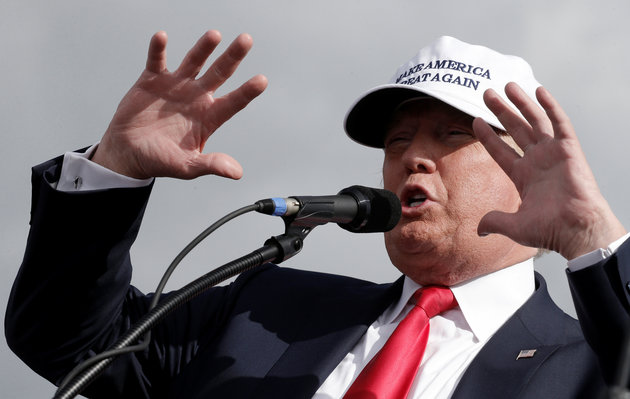Before eighth-grade history teacher Noah Corbett started a live chat with his students during Sunday night’s presidential debate, he put forth a disclaimer: You aren’t allowed to use inappropriate-for-school language just because a presidential nominee does.
It’s not the type of statement Corbett, who has been teaching for five years, typically has to make before a civics lesson. But this year’s election ― and its surrounding controversies involving sexual assault, infidelity and what Corbett’s students call “the tape” ― is by no means typical.
Since Donald Trump announced his presidential bid in June 2015 by declaring that Mexico has been sending “rapists” over the border, teachers have been dealing with the fallout of an election filled with over-the-top, inflammatory rhetoric. The businessman’s campaign has been stoking racially charged bullying in schools, according to a Southern Poverty Law Center report released in April ― a trend that has been dubbed the “Trump effect.”
Navigating issues of consent, assault and inappropriate language has only become more difficult since Friday, when The Washington Post published a leaked tape from 2005 in which Trump declares that his fame allows him to grab women “by the pussy.”
“One or two students said ‘the tape’ was disgusting,” Corbett said. “Others have kind of said, ‘I agree’ and left it at that. … None of them referred to it as sexual assault. I don’t know if they do or don’t quite have the language to talk about that.”
It’s not an issue that Corbett, who teaches at Maritime Academy Charter Middle School in Philadelphia, expected to navigate when teaching the election.
“In a typical election, the biggest issue you worried about tip-toeing around as a teacher would be something closer to abortion,” he said. “It’s something that gets students and parents riled up.”
The revelations surrounding the leaked audio led 11th-grade educator Jarrett DeMent to condemn a candidate for the first time in his 11 years of teaching. He didn’t tell students in his civics and government classes who he planned to vote for, just for whom he would not.
“I felt if I didn’t say something, my silence might be interpreted as accepting that type of behavior,” said DeMent, who teaches in Pennsylvania.
When students discussed the tape in class on Tuesday, DeMent told them they weren’t allowed to repeat phrases from the footage.
“Being that they are juniors in high school, I told them, ‘If you really want to know the exact quote, I’m sure you can find it online. But as far as what we’re talking about in class, we’re not going to exactly quote it,’” he said.
I felt if I didn’t say something, my silence might be interpreted as accepting that type of behavior.Jarrett DeMent, high school teacher
English teacher Dylan Fenton works at a school that didn’t hold classes for the first half of this week. During the break, he prepared for a student-led discussion about the leaked audio.
“I try not to lead my students to any types of conclusions,” he said. “Basically, if they’re saying something, I try and get them to tell me more. I will play devil’s advocate at times so they can respond and come up with more concrete opinions about what they’re saying.”
He said he doesn’t plan to stop students from repeating some of Trump’s more unsavory language ― as long as it is “in the context of course.”
Cindy Winston, who teaches at a charter high school in Arizona, also does not sugarcoat.
Students openly discuss their political concerns in her class, even though she teaches science.
“I’ll preface things like, ‘I’m going to tell you the same things I tell my own sons. You don’t use the word pussy. You just don’t. That is not common conversation,’” she said. “I’ve had conversations with my students about consent.”
If there is a silver lining to an election cycle that has candidates discussing topics that teachers would typically condemn, it’s that kids are paying attention. Corbett said his students are more engaged with current events than usual.
“Last year when topics would come up in class like the Chinese Exclusion Act or Trail Of Tears ― anything social justice-related ― or if race or discrimination came up, there would always be someone who would raise their hand and be like, ‘You got to talk about Donald Trump!’” he said. “It made a potentially easier real-world connection.”
Editor’s note: Donald Trump regularly incites political violence and is a serial liar,rampant xenophobe, racist, misogynist and birther who has repeatedly pledged to ban all Muslims — 1.6 billion members of an entire religion — from entering the U.S.
